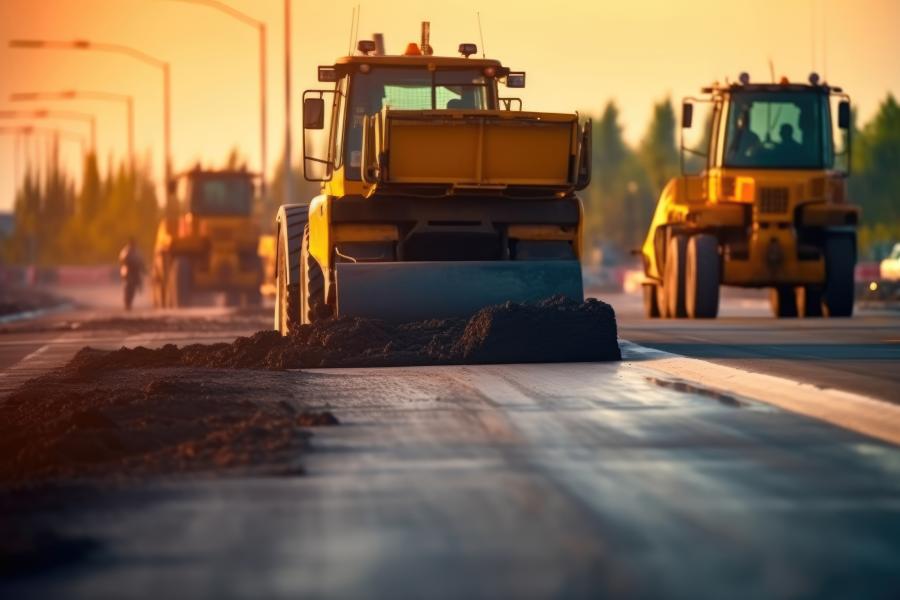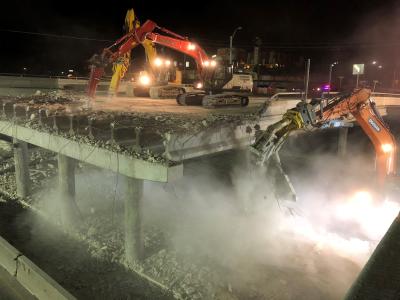Contractors should be aware that the proposed BABA rule applies to all infrastructure projects receiving federal funding.
While the construction industry awaits the Biden administration's final wording of its Build America, Buy America Act (BABA), contractors can study up on application of the rule. Meant to bolster the economy through the required use of domestically sourced construction materials, the rule is considered contradictory at best and confusing at worst.
The White House Office of Management and Budget (OMB) issued a Proposed Rule earlier this year regarding the implementation of BABA.
The proposed wording of the act, signed into law last fall as part of IIJA, has drawn criticism from several corners of the construction industry.
Attempting to Enhance Economy
"Contractors need to be aware of how the law… has changed and how it could affect their businesses," said Frank Tanzola and Kenneth Chapman of IAT Surety.
The law's construction material requirements apply to all infrastructure projects receiving federal funding — not just IIJA projects. This means not only where the fed is the contracting party, but also on projects where a state or local government entity is the contracting party.
Now, according to Tanzola and Chapman, "infrastructure' projects include roads, tunnels and bridges; railways; dams, ports, harbors and other maritime facilities. That also includes airports; water systems; electrical transmission facilities and systems; utilities; broadband; and any buildings associated with the project.
In addition to iron, steel and manufactured products, BABA's requirements now extend to construction materials. These materials, which also must be U.S. sourced, include commodities such as glass, drywall, fiber optic cable, non-ferrous metals like copper and aluminum. PVC and other plastic or polymer-based products are included; aggregates and cement are not.
"BABA incrementally increases the required domestic content threshold of manufactured goods from 55 percent to 60 percent, effective October 2022," said Tanzola and Chapman.
That figure goes up to 65 percent by 2024 and will top out at 75 percent in 2029.
"However, in certain instances, increases have been delayed pending review," they said. "Commercially available off-the-shelf items made abroad can be used if they are not modified."
BABA builds on "a complex patchwork" of Buy America restrictions that vary depending on which federal authority provides the infrastructure funding.
Roger Abbott, Lauren Fleming and Karl Means of law firm Miles & Stockbridge P.C. say that can be confusing. They explained that "Buy America" restrictions apply to domestic infrastructure funding. But, "Buy American" restrictions, such as the Buy American Act, apply to federal procurements.
"At times, these domestic preference restrictions vary even at the sub-agency level," said the three.
And, although Buy America regulations may be similar across federal agencies, any waivers for specific products are dictated by the funding authority.
"On the one hand, IIJA provided over $1.2 trillion for a broad range of infrastructure projects," said Abbott, Fleming and Means. "On the other hand, BABA imposed domestic preference restrictions to all federally-funded infrastructure projects, regardless of whether they are funded by IIJA."
Historically, domestic preference restrictions, by contrast were specific to particular appropriations and the federal entities that managed them.
Agencies must ensure that "none of the funds made available for a federal infrastructure program may be obligated unless all of the iron, steel, manufactured products and construction materials used are produced in the United States."
The trio of attorneys said BABA is intended to create a government-wide baseline that applies only when the standards fail to meet or exceed requirements.
"However, BABA expands the current domestic preference regime, which applies only to iron and steel and to manufactured products," they said.
The program does so by extending Buy America restrictions to a new category of inputs: construction materials. BABA lists several "common construction materials" that are "not adequately covered by a domestic content procurement preference."
However, it exempts "cement and cementitious materials, aggregates such as stone, sand or gravel, or aggregate binding agents or aggregates."
Construction Sector Not Amused
When the proposed rule was published, OMB solicited feedback on a laundry list of issues from a wide range of stakeholders. Comments include criticism about the expansive scope of the rule, ambiguities and internal inconsistencies in the proposed standards.
Those stakeholder comments also pointed to possible deviations from the parameters established by Congress.
"The proposed rule still appears to be a work in progress and leaves open a number of important questions," said Abbott, Fleming and Means. "Contractors and state and local authorities continue to face regulatory uncertainty about how the BABA restrictions apply to their infrastructure projects."
In fact, the AGC and ARTBA registered their criticisms of BABA last spring when OMB asked for comment. AGC wrote OMB's director Shalanda Young that the association believes rushing BABA could backfire.
"A rushed implementation could unnecessarily delay projects," said James Christianson, AGC vice president, government relations. "AGC members are eager to deliver on rebuilding the nation's infrastructure. However, with construction material shortages and supply chains constraints, it is vital that we do not exacerbate these conditions."
He pointed out that conditions have already made it challenging to ensure IIJA's success. Industry wants to ensure that the American people see the benefits of the "historic" IIJ law.
But Christianson said AGC worries that OMB has decided to not use a phased implementation to allow all stakeholders a much-needed adjustment period.
ARTBA also commented in March on the proposed guidance, saying the association had several concerns and objections. The "lack of clarity and logical timing" concerns ARTBA: "Buy America coverage took effect Nov. 10 for five categories of construction materials.
"And yet a proposed ‘de minimis' waiver, which would exempt smaller projects and a project's first million dollars of federal funding, is still pending after more than four months."
Another issue for ARTBA: Not using federal transportation agencies' expertise in administering BABA requirements. The Made in America Office, created to oversee the federal government's domestic preference programs, should incorporate existing DOT Buy America policies," said the association.
ARTBA believes that's a more logical move than modifying or overriding DOT policies, which would delay implementation.
Extending Buy America coverage to materials beyond — or in conflict with — Congress' intentions bothers the group.
"The IIJA exempts ‘cement and cementitious materials, aggregates such as stone, sand or gravel or aggregate binding agents or additives' from construction materials covered by Buy America," noted ARTBA
But OMB's draft guidance suggests these items can be covered if combined to make another product.
"ARTBA strongly opposes this potential policy and OMB's proposed expansion of covered materials beyond the five categories Congress specified."
The association plans to fully review and analyze the final OMG guidance, even though the date of its release remains a mystery.
"The association will also submit comments supporting the manufactured products waiver and asks for input from members and chapters."
ARTBA also is collaborating with other associations on potential administrative petitions that seek more transparency and efficiency in BABA implementation.
What Contractors Can Do Now
The IAT Surety specialists say if a contractor is working on a federally funded project, compliance with applicable Buy American requirements is critical.
The surety firm suggests staying on top of the rule by following a protocol of best practices:
- Get certification from your suppliers. IAT Surety suggests a contractor obtain confirmation that the construction materials or manufactured products comply with BABA requirements.
- Share liability. Construction contracts with subs and suppliers should include language making them responsible for the cost of BABA non-compliance, said the firm.
- Stay current with requirement changes. "Laws change frequently. Pay close attention to bulletins issued by federal agencies such as the OMB," said IAT Surety. "Conditions for waivers could change along with the types of construction materials subject to BABA" Though exceptions may also change, they said.
- Don't count on a waiver. BABA is in place for a reason, so waivers will not be easy to obtain and are likely to be project or even product specific. "Perform your due diligence, be aware that the timing to implement BABA requirements is not uniform for all federally funded infrastructure projects," said IAT. "And make sure BABA requirements applicable to the project are met," the surety firm added.
- Consider dedicating a person to BABA oversight. Make sure you record all facts surrounding the job and BABA compliance. Task someone with tracking documentation. Instead, have a dedicated person in charge of compliance with BABA. "Whenever in doubt, seek legal advice," said IAT.
Finally, keep in mind that failure to comply with applicable BABA requirements can result in the need for removing and replacing completed work. That happens at your cost, said the surety firm, and may include termination from the contract and potentially even debarment from federally funded work.
"In addition, knowingly failing to comply with Buy American requirements can lead to liability under the False Claims Act, penalties under which includes treble damages," the firm said. CEG
Today's top stories






















